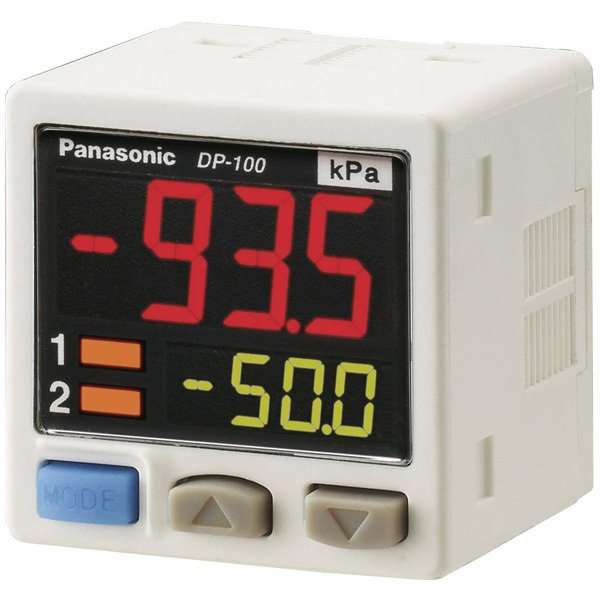Panasonic DP-102A Sensor: Accurate and Reliable Solution for Industrial Pressure Measurement
What is the Panasonic DP-102A Sensor?
The Panasonic DP-102A is a compact sensor that provides high precision in digital pressure measurement. It can be effectively used in industrial environments, especially in applications requiring precise measurement and control. The DP-102A sensor delivers reliable measurements and exceptional performance even in challenging conditions.
Technical Specifications of the DP-102A Sensor
- High Measurement Accuracy: Accurately detects even minor pressure changes.
- Digital Display: The LED display allows for clear and easy monitoring of measurements.
- Compact Design: Enables easy installation even in tight spaces.
- Wide Operating Voltage Range: 12-24V DC compatibility ensures seamless integration with various systems.
- Durable and Robust Build: Supports long-term use in demanding industrial environments.
- Pressure Measurement Range: A wide range of 0 – 1 MPa makes it suitable for different applications.
Advantages of the DP-102A Sensor
- High Precision: Minimizes error in pressure measurements and ensures reliable data.
- User-Friendly Design: Compact size and digital display enable easy installation and operation.
- Long-Term Performance: Built with durable materials, reducing maintenance costs and ensuring extended use.
- Energy Efficiency: Low power consumption helps reduce operational costs.
- Versatility: Suitable for use in various industries and applications.
Applications of the Panasonic DP-102A Sensor
The Panasonic DP-102A sensor is widely used in various applications:
1. Industrial Automation
Ideal for precise pressure control in production lines, such as liquid and gas flow regulation.
2. Hydraulic and Pneumatic Systems
Supports accurate pressure data for hydraulic systems and pneumatic devices.
3. Medical Applications
Preferred for medical devices, particularly ventilators and systems requiring precise pressure control.
4. HVAC Systems
Used in heating, ventilation, and air conditioning systems for pressure measurement and control.
5. Research and Development
Provides accurate measurement data for laboratory and university projects.
6. Food and Beverage Production
Optimizes pressure control and automation processes in food processing and beverage production lines.
How to Install the DP-102A Pressure Sensor
The DP-102A sensor installation guide ensures proper mounting and operation of the device:
- Prepare: Gather all necessary tools and cables.
- Mount the Sensor: Carefully attach the sensor to the designated connection points.
- Make Electrical Connections: Connect the sensor to a power source within the specified voltage range.
- Calibrate: Adjust the sensor according to the required pressure range.
- Test: Run the system to ensure the sensor provides accurate measurements.
Where to Buy the DP-102A Sensor?
Users looking to purchase the **DP-102A sensor** can access this product through authorized Panasonic distributors or trusted e-commerce platforms.
Shopping Tips:
- Shop from authorized dealers to ensure genuine products.
- Use online stores to compare prices and read customer reviews.
- Contact authorized service centers for technical support if needed.
User Reviews
“Offers high precision in pressure measurements and was very easy to install due to its compact design.”
“We optimized our automation processes and saved energy costs with its efficiency.”
“Panasonic’s product is durable even in challenging conditions. The digital display is very user-friendly.”
Related Articles: Learn more about the sensors by reading our blog on What is a Pressure Sensor? Where is it Used?
Why Choose the DP-102A Sensor for Your Business?
The Panasonic DP-102A sensor is not only a precise measurement device but also a smart investment for businesses that prioritize efficiency and safety. Its ability to provide real-time and reliable pressure data reduces the risk of downtime and production errors, which directly translates to cost savings. Thanks to its compact size and compatibility with a wide voltage range, the DP-102A integrates seamlessly into existing industrial systems, from automation lines to research laboratories. This versatility makes it an all-in-one solution for companies across different sectors.
Long-Term Reliability and Business Value
One of the biggest advantages of the DP-102A sensor is its robust build, which ensures long-term stability and minimal maintenance requirements. With regular calibration and correct installation, the sensor maintains its accuracy for years, helping companies avoid unnecessary replacement costs. Panasonic’s strong global support and service network also provide added confidence, ensuring that businesses can rely on professional assistance whenever needed. For industries aiming for sustainable growth and consistent quality, the DP-102A sensor delivers both technical excellence and long-term business value.

